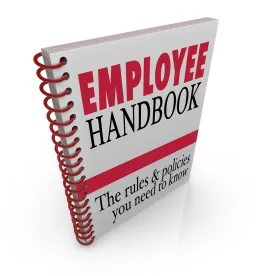The National Labor Relations Board has once again clarified whether certain types of employee handbook policies will violate federal labor law. Employers should take note of these two new guidance memoranda, as they can help employers maximize the protection they afford to their confidential information, brands, equipment, and other important matters.
As most employers know, in late 2017, the Board changed its standard for determining when “facially neutral” handbooks and other written policies will violate the National Labor Relations Act (i.e., policies that do not specifically address union activities or other protected concerted activities). This standard arises from the fact that the Act generally prohibits employers from “restraining, coercing, or interfering with” employees who are attempting to improve group working conditions. The Board’s new standard affords employers significantly more flexibility to maintain policies that address important subjects, but which employees might deem to implicitly prohibit protected activities. Under the Board’s new standard, even if an employee could reasonably construe a facially neutral policy to prohibit protected activities, the policy would pass muster if the employer issued the policy for legitimate reasons and those legitimate reasons outweighed the policy’s impact on employees’ protected rights.
Since the Board implemented this new standard, it has clarified on several occasions when certain types of policies will violate the Act. We covered this prior guidance here and here.
Recently, the Board’s Division of Advice issued another set of guidance on this issue. The Division of Advice helps Board agents determine which cases to pursue, and the Division falls under the authority of the Board’s General Counsel, so this guidance strongly signals how the full Board will address these types of issues going forward.
Even under the new and more balanced standard, the Board’s Division of Advice determined that several of the policies at issue violated the Act. Specifically, it took the position that:
- It is unlawful to require employees to keep employee handbooks confidential. According to the Division, this would unlawfully prohibit employees from discussing pay, benefits, and other working conditions with unions, the media, and other third parties.
- Under current law, when an employer allows employees to use its email system for work, the employer may not prohibit employees from using its email system for protected activities outside of working time. Interestingly, the Division clarified that it reached this conclusion “under extant Board law.” At the same time, the Board recently solicited public comments about whether to revise the applicable standard in this area. This signals, yet again, that the Board may overturn the Obama-era decision, Purple Communications, Inc., that expanded employees’ rights to use employers’ email systems outside working time for protected activities.
- It is unlawful to prohibit employees from disclosing “payroll.” The Division reasoned that this would unlawfully discourage employees from discussing their pay and benefits, which would constitute protected concerted activity. An employer may, however, prohibit employees from disclosing certain discrete types of information that may appear on payroll (such as social security numbers and certain health insurance information).
- An employer may not prohibit employees from using cell phones during all “working hours” (but the rule would be different if it referenced “working time”). The Board has long held that an employer may not prohibit solicitation during working “hours,” because employees have a right to discuss unions and other protected activities during breaks, and because an employee might construe working “hours” to include breaks. An employer generally may, however, prohibit solicitation during working “time,” because the Board understands that term to exclude break time. Here, the Division extended this “working hours” vs. “working time” distinction to cell phone usage.
The Board’s Division of Advice did, however, find certain types of policies to be lawful under the new standard:
- An employer may maintain a dress code policy prohibiting “items of apparel with inappropriate commercial advertising or insignia.” According to the Division, an employee would not reasonably construe this policy to prohibit union insignia. The Division clarified, however, that an employer may not necessarily enforce this type of policy to prohibit union buttons or similar apparel. (Again, the Board was only addressing whether the employer could lawfully maintain such a policy in its handbook, rather than whether an employer could apply it in specific situations.)
- An employer may require that “only designated spokespersons” provide information to the media. Although employees generally have the right to provide information to the media when they are attempting to improve group working conditions, the Division found that an employee would construe this policy only to people speaking on the employer’s behalf.
This new guidance will further assist employers as they are assessing how they may articulate important handbook policies. Because the Board seems to understand that this is an important issue, and has been regularly providing guidance, employers should continue monitoring for additional updates in the future.




 />i
/>i

